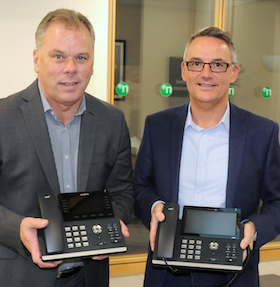Virgin Media and BT have sealed a new five year Mobile Virtual Network Operator (MVNO) agreement.
Under the new deal, EE, a BT Group company, will provide wholesale mobile network services to Virgin Media, a subsidiary of Liberty Global.
The full MVNO agreement, which covers voice and data services, replaces an existing MVNO wholesale agreement between the two companies and extends its exclusivity to 2021.
Peter Kelly, MD of Virgin Mobile, said: "This will give Virgin Mobile more control and firepower to deliver services to the UK mobile market."
Gerry McQuade, CEO of Wholesale and Ventures, BT, added: "This has proven a successful relationship for both parties for many years and, as we enter a period of further technological change in the mobile market, we are very pleased to renew and extend our 17 year old relationship.
"BT values the economy of scale that Virgin Media brings to our network."
Virgin Mobile was established in 1999 and is said to be the world's first virtual mobile operator. It boasts three million UK subscribers.
In November 2016 Virgin Mobile launched fast 4G in the UK.
Wholesale and Ventures is a BT business that provides network products and services to more than 1,400 communication providers operating in the UK.

 Cisco partner Ideal has appointed former Trustmarque cloud and managed services chief Mike Henson (pictured) as MD, taking over from co-founder Claire Hopkins who becomes Founding Director and will focus more on supporting the executive management team.
Cisco partner Ideal has appointed former Trustmarque cloud and managed services chief Mike Henson (pictured) as MD, taking over from co-founder Claire Hopkins who becomes Founding Director and will focus more on supporting the executive management team. A reseller event hosted by Nimans, Microsoft and Yealink at the Belfry golf and leisure resort aimed to raise awareness of Skype for Business and its projected 250% growth trajectory this year.
A reseller event hosted by Nimans, Microsoft and Yealink at the Belfry golf and leisure resort aimed to raise awareness of Skype for Business and its projected 250% growth trajectory this year. Pennine stalwart Geoff King (pictured left), Product and Services Director, has retired following the sale of the business to the Nycomm Group.
Pennine stalwart Geoff King (pictured left), Product and Services Director, has retired following the sale of the business to the Nycomm Group. Duffy (pictured left) is a Fellow of the Institute of Science and Technology and brings over 26 years experience working in IT and technical services.
Duffy (pictured left) is a Fellow of the Institute of Science and Technology and brings over 26 years experience working in IT and technical services.